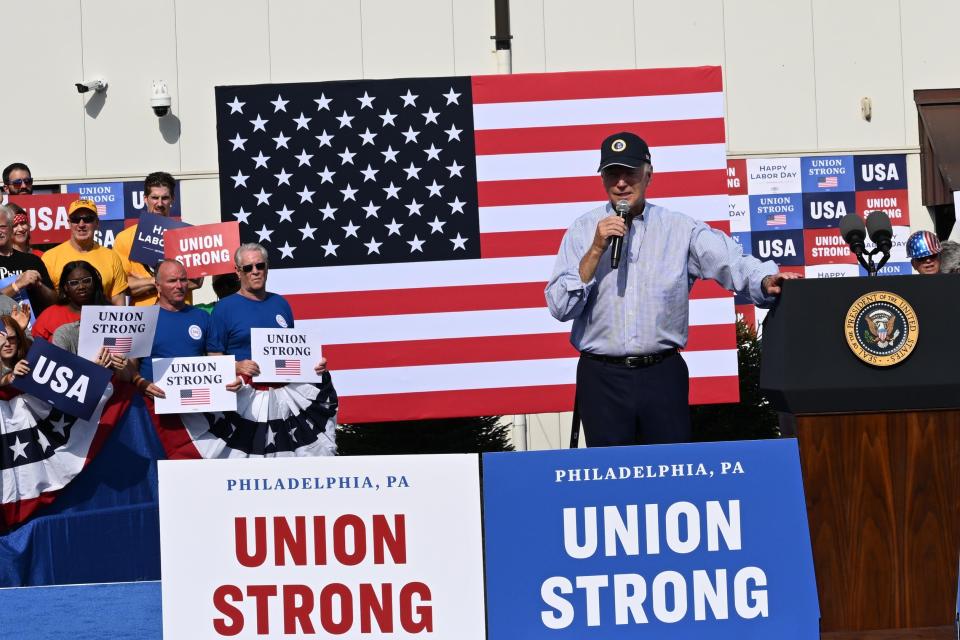With UAW strike looming, Biden must choose between his union allies and US economy
Joe Biden, who has built his presidency around pandering to labor unions, launched his 2020 campaign by saying: “I make no apologies. I am a union man. Period.”
He has also claimed that he’s the “most pro-union president leading the most pro-union administration in American history.”
In return for his pledged support, unions donated generously (more than $27 million) to help get him into the White House.
Now they expect Biden’s undying loyalty in return. That fealty is facing its ultimate test this week as the United Auto Workers threatens the largest strike in the union's history.

If Detroit's Big Three automakers don’t meet the union’s outrageous pay and benefit demands by Thursday, the roughly 150,000 members are set to go on strike – a move that would be unprecedented.
Given the ripple effects on the nation’s economy and automotive production, a strike would strain Biden’s role as labor’s guy in the Oval Office.
The Anderson Economic Group estimates that a 10-day strike on all three automakers “could result in a total economic loss of more than $5 billion.”
“It would be extremely economically significant,” says Steve Delie, director of labor policy at the Michigan-based Mackinac Center for Public Policy. “It could be potentially more devastating than strikes in the past.”
Biden overtime pay law doesn't add up: Biden's overtime pay proposal is the last thing our economy needs. Employers must speak up.
Biden told by union boss to 'pick a side'
Despite their cozy relationship, tensions are running high between Biden and the UAW. Last week, Biden ticked off UAW President Shawn Fain when he said he didn’t think a strike was going to happen. Fain fired back in an interview on CNBC, saying it’s time for “politicians in this country to pick a side.”
Contract negotiations between Fain and Detroit automakers General Motors, Ford Motor and Stellantis face a Thursday night deadline, and so far, offers by the companies have faced a hard “no” from the union.
The UAW is demanding a 46% pay hike over four years, a 32-hour work week (for full pay), the end of a tiered pay system for newer workers, as well as the return of pensions and retiree health care. It’s a big ask, and the union doesn’t seem interested in giving in on any of its demands.
Opinion alerts: Get columns from your favorite columnists + expert analysis on top issues, delivered straight to your device through the USA TODAY app. Don't have the app? Download it for free from your app store.
Such significant increases in salaries and benefits would put the Big Three in an extremely uncompetitive position with foreign competitors and Tesla. If the UAW gets everything it wants, workers could earn about $100 an hour in total compensation – roughly twice what their nonunionized counterparts make. Even now, UAW workers make more an hour than the competition.
The negotiations come at a time when the Biden administration, driven by climate change zealotry, is forcing the U.S. auto industry to retool itself quickly for an electric vehicle future through new emissions standards.
UAW leadership has expressed concern about the administration’s aggressive goals and how it could affect members.
The transition to electric vehicles also poses a much less certain future for Detroit automakers as they move away from the cars and trucks that continue to be profitable to invest in new technologies.

In other words, it’s not a great time, amid the upheaval in the industry, to force the automakers’ hand on costly pay and benefits.
That’s not making Fain shy away from his demands – nor his expectation that Biden act as a cheerleader.
Is this a union resurgence?
Given all the attention unions have received in recent months – and the support of Biden and Democratic governors – it may seem like unions are gaining in power. The Hollywood writers' and actors' strikes are ongoing, and other unions have threatened to walk off the job.
The numbers tell a different story, however. Union membership continues to fall, and unionization in the United States reached its lowest rate (10.1%) in 2022, according to government statistics. That rate has fallen by half since 1983, the first year for which comparable data's available.
Right-to-work laws, which give workers a choice about joining unions and paying dues, have been enacted in more than half the states, and the U.S. Supreme Court has upheld right to work for all public-sector employees.
Right to work: Michigan posts 'closed for business' sign to please unions. Biden wants the same for US.
Democrats, however, don't want workers to have that choice. Biden is pushing federal legislation that would overturn right-to-work laws across the country.
And Michigan, where the UAW battle is taking place, recently overturned its decade-old right-to-work law, under the guidance of Democratic Gov. Gretchen Whitmer. That will help boost unions' coffers and has no doubt contributed to the UAW's bold demands.
If the strike happens, it will hurt an already-faltering economy plagued by the lingering pain of inflation – an issue that is one of Biden’s largest shortfalls among voters. Consumers also will notice if new- and used-car prices spike as a result of a strike – or eventually because of sky-high worker wages and benefits.
The question remains: Will Biden side with powerful union bosses? Or will he do what's best for the country?

Ingrid Jacques is a columnist at USA TODAY. Contact her at ijacques@usatoday.com or on Twitter: @Ingrid_Jacques
You can read diverse opinions from our Board of Contributors and other writers on the Opinion front page, on Twitter @usatodayopinion and in our daily Opinion newsletter. To respond to a column, submit a comment to letters@usatoday.com.
This article originally appeared on USA TODAY: Union or economy? UAW strike will force Biden to 'pick a side'


